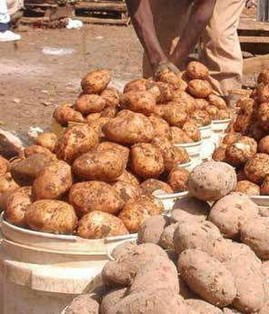
National Potato Council of Kenya: To be able to increase productivity of potatoes, it will require addressing the current challenges of inadequate availability of certified seed potato, poor agronomic practices, high postharvest losses.
That potato farming in Kenya is a hot topic is no-brainer.
It all stems from the public furore that erupted sometimes in January last year when the giant Americanfast-food chain (Kentucky Fries Company) disclosed that it does not source potatoes locally because of quality standards.
The fast-food chain,which has been operating in Kenya since 2011,ran out of pre-sliced potato imports largely from Egypt. KFC-which is popular with urban middle-class households in Kenya,insisted that local potato varieties did not meet its international standards and taste.
The ‘noise’ that followed on social media,from potato farmers,the blame games and the counter-blame games only highlighted one thing;a major deficiency in economic policy making especially when it comes to developing local supply chains.
And as if to quell the ‘noise online’ ,KFC had at that time indicated, it was on a journey to identify a local supplier who will meet their quality standards.
Consequently, the state would later prioritize potato as a flagship tuber crop to help power their agenda of a 100 percent food nutrition and security.
Evidently,the steam to make potatoes a lucrative cash crop in the country is gathering.
Only recently,the country’s Agriculture Cabinet Secretary Mithika Linturu voiced the need to embrace the tuber crop as a food crop to reduce over reliance on maize that is becoming scarce due to the vagaries of weather.
Kenya is the fourth highest potato producing country in Africa but has the lowest yield per acre. Agriculture Ministry projects that Kenyan potato farmers only produce 10 tonnes per hectares against a potential of 60 tonnes perhectares due to production challenges.
According to the National Potato Council,the plan is to increase potato production from the current 2.1million metric tonnes to 2.5 million metric tonnes by 2025. “To be able to increase productivity of potatoes,it will require addressing the current challenges of inadequate availability of certified seed potato, poor agronomic practices, high postharvest losses,”said Wachira Kaguongo, chief executive Officer at National Potato Council of Kenya.
there are 28 registered seed potato merchants in the country,with only 4 producing substantial amounts of seed,though they cannot satisfy the high demand for certified seeds in the country.
In the 2021 potato variety catalogue,there are 67officially released varieties in Kenya,however,only about 24 varieties are locally produced.
In April 2023,the media went into frenzy with reports that Kenya had imported the “Memphis” variety of potato seedlings-and were being piloted in leading potato growing areas.
The local media,at that time,reported that the “Memphis variety” was high-yielding,long dormancy-making them suitable for international markets because of longer shelf life.
However,in an exclusive interview with HortiNews Magazine the potato lobby has termed the media reports on this variety as “misconception and misleading”to the local potato farmers.
Mr Kaguongo categorically noted that its only the Markies potato variety that the lobby and KFC had identified to be supplied to the to cut over reliance on imports.

“We are also wondering about the basis of this news item.It might have been mistaken with Markies variety because now one in the Country is aware of this variety. Markies is a variety owned by Agrico and it has been approved to source from local farmers in Kenya,”he said.
According to Agrico website,Markies is a very good potato for French fries(chips) and crisps and is in big demand all over Kenya.Processors and restaurants value it for its frying characteristics and taste.Its low sugar level remains for a long time enabling excellent cooking quality.
Markies is a yellow skin potato and lat maturing(120 days).Although Memphis potato variety exists,it has not been introduced in Africa.
According to Mr Feico Born Product Manager of HZPC Holland BV,a private potato growing companies working in Tanzania the Memphis variety does not have good attributes for processing,and that “I would not recommend it to be introduced to Africa since we have other superior varieties than Memphis,”said Mr Born whose company is promoting 7 HZPC potato varieties in Tanzania when he paid a courtesy call at NPC offices in Nairobi recently.
As a major shifts towards to effectively address the challenges in the potato value chain,the Ministry of Agriculture and potato value chain players have outline an important document,the national potato strategy 2021-2025 to streamline the sector.
The National Potato Strategy 2021-2025 intends to harmonise the activities of different players and fully utilise their synergies and complementaries by guiding all actors both at county and national levels to address these challenges and tap into available opportunities.
The overall goal of the strategy is to transform the potato industry into a commercially oriented enterprise that ensures sustainable food and nutrition security and surplus for trade,export,and increased incomes.
Kenyan farmers lose more than 30 percent of their potatoes after harvest.To help farmers cut on post-harvest losses as well as earn better prices for their produce,the government has since launched potato cold storage facilities in several growing areas.The ministry is in the process of unveiling the Sh100 million-potato cold storage facilities in Ol Kalou,Nyandarua County
Mr Kaguongo explains that proper potato storage is key to ensuring a consistent supply of potatoes throughout the year as well as stabilizing ever-fluctuating potato prices.
“Potato production usually follows the rainfall pattern,thus creating regular surpluses and shortages in the course of the year.Indeed, potato farmers lack the ability to influence selling prices for their potatoes for reasons that include the high perishability of potatoes, a lack of adequate storage facilities, and the activities of brokers and cartels that have negative effects on the market. Over 80% of commercially marketed potatoes go through middlemen,”explained Kaguongo.
“There are also high losses and wastes, up to 40%, along the potato value chain, of which about 95% arise from damaged potatoes at the production level. Launching of the potato storage will significantly help to address these challenges.”
And the focus on pushing the root tuber to the country’s food security map continues in earnest not only in Kenya but globally too.For example,the Food and Agriculture Organisation has marked 30th May this year for the International Day of Potato making it the first international day declared for a major crop.
The Potato Council also plans to combine the International Day of Potato celebrations with the National Potato Conference scheduled for 30th and 31st May 2023.Early this year Kenya won the pitch to host World Potato Congress 2023.
“This is a testament of the many qualities of the potato that make it a vital tool in helping to eradicate poverty,improve food security,and provide healthy and nutritious food to millions of consumers around the globe,”said Mr Kaguongo.
Nationally,per capita potato consumption is estimated at 25 kilograms a year with a total consumption of 2.3 million metric tonnes of potatoes estimated by 2022.
